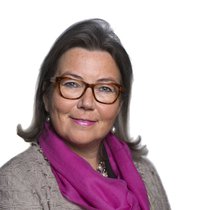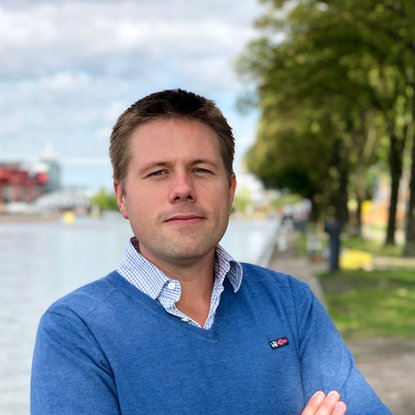Singapore's vertical farming industry and international research institutes have taken a significant step forward with the signing of a Memorandum of Understanding (MOU) between several leading companies in the field. The MOU was signed between Growy, Wageningen University & Research (WUR), the National University of Singapore (NUS), Republic Polytechnic (RP), Amsterdam Institute for Advanced Metropolitan Solutions (AMS Institute) and Nanyang Technological University Singapore (NTU) on Monday, April 3rd.
The vertical farming industry in Singapore has been growing rapidly in recent years, with more and more companies utilizing the method to produce food in a sustainable and efficient way. Vertical farming is seen as a solution to the challenges of limited land resources and food security.
dr. Richard Harrison (managing director Plant Science Group of WUR) and Eveline van Leeuwen (Scientific Director of AMS Institute)
“We are glad to see that this MoU creates new partnerships that will increase knowledge in efficient vertical farming. The Netherlands believes companies, knowledge institutions and governments working hand-in-hand leads to the best results”
Anneke Adema | Netherlands ambassador in Singapore

The MOU aims to promote international collaboration to further develop vertical farming in Singapore. The parties will work together to share knowledge and expertise in the areas of research and development, technology, and operations. Additionally witnessed by the National Research Foundation (Singapore), the Deputy Head of Mission of the Embassy of the Kingdom of the Netherlands in Singapore, Wageningen University & Research (WUR), and Amsterdam Institute for Advanced Metropolitan Solutions (AMS Institute), the MOU bridges the research ecosystems from the Netherlands and Singapore, with the intention to take up the challenge of 30by30 (30% local production in 2030) and beyond as important partners for Singapore in this development.
All signees have a common goal of advancing the state of vertical farming technology, increasing production efficiency, and reducing the environmental impact of agriculture.
With the signing of this MOU, Singapore's vertical farming industry is expected to continue its growth trajectory and become a global leader in sustainable agriculture. This is a significant development for Singapore as it seeks to ensure sustainable food production for its population.
“The Netherlands is globally recognized as a leader in agro-food technology and is working hard at becoming more sustainable, reducing waste and producing more locally. Joint innovation is key in this transition, and Singapore and the Netherlands must continue to develop the future of farming together”
Anneke Adema | Netherlands ambassador in Singapore

Prof.dr.ir Leo Marcelis (Head of chair group Horticulture and Product Physiology, and PI at AMS Institute)
About Growy:
Growy is an indoor vertical farming company from Amsterdam dedicated to improving the global food system by providing tasty, healthy, and affordable greens. Growy achieves this using next-level technologies such as robotics, machine learning and agile ways of working, which are combined with decades of experience in agriculture to build and operate financially profitable indoor vertical farms. Growy is finalizing the construction of a large scale farm in Singapore. For more information visit Growy.nl.
About Wageningen University & Research:
Wageningen University & Research (WUR) is one of the leading international universities in the field of healthy food and living environment. ‘To explore the potential of nature to improve the quality of life’. That is the mission of Wageningen University & Research (WUR).
About Faculty of Science, National University of Singapore (NUS)
NUS is one of the top universities in Asia and the world for science education and research. The Faculty offers interdisciplinary undergraduate academic programmes under the College of Humanities and Sciences and industry-relevant postgraduate programmes to nurture talent. Our research advances scientific knowledge and creates impact by addressing real-world problems.
About Republic Polytechnic:
The first educational institution in Singapore to leverage the Problem-based Learning approach for all its diploma programmes, Republic Polytechnic (RP) has seven schools and one academic centre offering 37 full-time diplomas in Applied Science, Engineering, Management and Communication, Hospitality, Infocomm, Sports, Health & Leisure, and Technology for the Arts.
RP is committed to nurturing professionals with strong problem-solving capabilities through an innovative and entrepreneurial learning environment, based on a holistic and industryrelevant curriculum. RP's Academy for Continuing Education also offers a comprehensive suite of lifelong learning programmes to provide adult learners with skills upgrading opportunities. For more information, visit http://www.rp.edu.sg.
About AMS Institute:
AMS Institute is the joint knowledge institute of TU Delft, WUR, and MIT, based in Amsterdam. The institute conducts research on metropolitan issues, focusing on energy transition, autonomous mobility, climate-resilient cities, circularity, local food systems, and digitization.
About Nanyang Technological University, Singapore
A research-intensive public university, Nanyang Technological University, Singapore (NTU Singapore) has 33,000 undergraduate and postgraduate students in the Engineering, Business, Science, Medicine, Humanities, Arts, & Social Sciences, and Graduate colleges.
NTU is also home to world-renowned autonomous institutes – the National Institute of Education, S Rajaratnam School of International Studies, Earth Observatory of Singapore, and Singapore Centre for Environmental Life Sciences Engineering – and various leading research centres such as the Nanyang Environment & Water Research Institute (NEWRI) and Energy Research Institute @ NTU (ERI@N).
Under the NTU Smart Campus vision, the University harnesses the power of digital technology and tech-enabled solutions to support better learning and living experiences, the discovery of new knowledge, and the sustainability of resources.
Ranked amongst the world’s top universities, the University’s main campus is also frequently listed among the world’s most beautiful. Known for its sustainability, over 95% of its building projects are certified Green Mark Platinum. Apart from its main campus, NTU also has a medical campus in Novena, Singapore’s healthcare district.
About National Research Foundation
The National Research Foundation is a department within the Prime Minister's Office. NRF sets the national direction for research and development (R&D) by developing policies, plans and strategies for research, innovation and enterprise. It also funds strategic initiatives and builds up R&D capabilities by nurturing research talent. The NRF aims to transform Singapore into a vibrant R&D hub that contributes towards a knowledge-intensive, innovative and entrepreneurial economy; and make Singapore a magnet for excellence in science and innovation.
